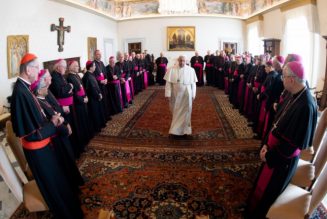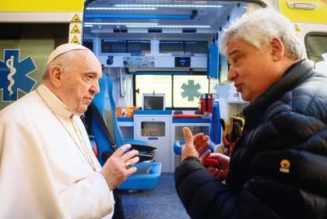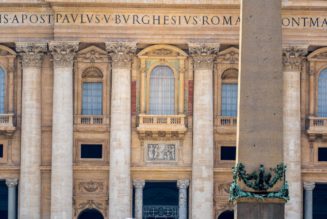By Dr. Jeff Mirus ( bio – articles – email ) | Dec 01, 2023
I have a significant fear of being wrong. It is not that I simply want to avoid the embarrassment of being wrong about some question of fact. The problem is that I do not want to be wrong about the difference between virtue and vice in my own personal life. I don’t want to find out only after I die that some habitual attitude or behavior led to the accumulation of unrecognized sins. Insofar as these are unrecognized without deliberate fault, they would be venial sins, but what if I only kidded myself about not recognizing them? What if I rationalized? This question comes up again and again not only in my personal life but in my responses to the condition of the Church.
Let me take one example from each category. First, in my personal life, I tend to be somewhat reclusive. I don’t feel a great need to make friends and socialize or to keep up frequent communication with siblings who live far away, though I am willing to help when help is needed. I let my wife decide a lot of these “social” questions because I don’t really trust my own judgment. At the same time, if I were convinced that this were a moral failure, I would have to more radically change my social habits.
Now, a Catholic may take a job in a distant land or enter a monastery and never see old friends, parents, brothers and sisters—or even grown children—again. Presumably, then, some kinds of habitual familial and social interaction are, in and of themselves, spiritually optional, at least in some circumstances. I personally think one would need a far better reason to choose a path that separates oneself permanently from children (including grown children) than from siblings or friends.
At the same time, the various possibilities can be abused. I have always been troubled by those women saints who are renowned for leaving their children, before they were fully grown, to enter a convent. Typically these have been ladies of high station whose children were largely in the care of others anyway. Nonetheless, I suspect the hagiography is a bit one-sided, and that they became saints in spite of that decision, not because of it. And so it might be with many of us. There is always the possibility that we will become holy in spite of some decisions which seemed to be grand gestures or at least personally appropriate at the time.
Spiritual attitudes
Now it is clear that a similar sort of moral dilemma arises with respect to our responses to what we regard as errors and sins within the Church, and especially on the part of Church leaders. Many priests and bishops make statements and implement policies which serious Catholics regard as either imperfect or simply wrong. This can also be true of popes. The Church as a whole is always in serious need of reform and renewal, but even people who recognize the problems differ very widely on the solutions. On the one hand, the offending prelate may be thought too quick to substitute contemporary ideas for traditional Catholic judgments; on the other, he may be thought too slow to understand the need for change and development in at least some of those judgments. Similarly, people vary widely as to whether this or that churchman is either too quick to affirm the fundamental goodness of the sinner or too quick to affirm the fundamental evil of the sin.
In most periods of Church history there have been significant divisions along these lines over one issue or another, divisions that boil down to the respective mindsets of the parties who are wrestling with a particular problem within the Church. Certainly security lies in a proper understanding of what the Church has taught formally in the past about the various issues at stake; and clearly, those who think Church teaching can be changed to suit the desires of the dominant culture have substituted the ideas of the dominant culture for the Holy Spirit. The overall lines of controversy may actually be fairly clear, in which case the various parties will divide according to whether they prefer fidelity to Divine Revelation or the tempting contradictions offered by the larger culture. But in our judgments of each person and each situation, and even of each priest or bishop or pope, we generally have only partial information, so that we cannot always be sure of responding in the best way.
This does not mean we can never be sure. Patterns of speech and behavior develop over time and can be reviewed, understood and analyzed with the eyes of Faith. Eventually, for the good of our own souls and for the souls who may partially depend on us for insight, a pattern is clear enough to merit comment in order to protect and reassure those who may otherwise be misled. But even in this, people vary widely. Some find relief and reassurance in such clarifications and judgments; others find such attempts at clarification, criticism and correction to be quite disturbing to their own spiritual peace within the Church.
For anyone who has undertaken a responsibility to strengthen the faith of others—whether a parent in a family, a priest in a parish, a teacher in a classroom, or a Catholic commentator to the public at large—these judgments and how we express them are one more source of potential harm which can result in spiritual damage. Moreover, even when correct, such clarifications and judgments can help some in their life of faith while disturbing others.
In other words, this is a large and spiritually dangerous responsibility. Moreover, it is a responsibility that nearly always results in factionalism. Consider how many different shades of opinion there are about the best response to problems in the Church:
- A formal degree of ecclesiastical disobedience resulting in separation from ecclesiastical control;
- Vociferous denunciation and condemnation without any formal ecclesiastical breach;
- Cautious and careful clarification with measured criticism in the light of established Church teaching;
- Silence, either through cowardice or to avoid making things worse;
- The pious effort to present every representative of the Church, and especially the Pope, in a completely exculpatory light.
Speaking the truth in love
The purposes of CatholicCulture.org are to enrich faith, strengthen the Church and form Catholic culture. We do not believe this job can be adequately done without commenting on public statements of Churchmen and other prominent Catholics which undermine or contradict the Church’s own clearly-established teachings on faith and morals. When case after case arises almost unrelentingly, it becomes more difficult to do this without the sort of loss of temper which slides so easily into making judgments about the state of another person’s soul. I am speaking here of the difference between clarification of Catholic teaching and condemnation of a person.
We may be forgiven the very occasional lapse, I hope. But at the same time, we are always balancing the best way to respond against the perceived gravity of the offense, just as we are always balancing the need to speak the truth with the need to treat with respect those who have been set over us in the Church. This is not easy and—as I said at the beginning—I have a healthy fear of being wrong. Perhaps, then, I would do well to remember St. John’s axiom that “perfect love casts out fear” (1 Jn 4:18). And perhaps I should take ever more to heart these words of St. Paul:
And his gifts were that some should be apostles, some prophets, some evangelists, some pastors and teachers, to equip the saints for the work of ministry, for building up the body of Christ, until we all attain to the unity of the faith and of the knowledge of the Son of God, to mature manhood, to the measure of the stature of the fulness of Christ; so that we may no longer be children, tossed to and fro and carried about with every wind of doctrine, by the cunning of men, by their craftiness in deceitful wiles. Rather, speaking the truth in love, we are to grow up in every way into him who is the head, into Christ, from whom the whole body, joined and knit together by every joint with which it is supplied, when each part is working properly, makes bodily growth and upbuilds itself in love. [Eph 4:11-16]
Perhaps we should all wonder just little bit about how we deal with this and many other dilemmas. And perhaps we should all wonder just a little bit about being wrong. There can be no substitute in all this for study, prayer and the virtue of prudence. But in another sense, it is usually not our fault that we have to deal with it. Every Catholic who has been baptized priest, prophet and king has at least some appropriate measure of this responsibility in his vocation and state in life.
So, yes, I am afraid of being wrong, and I think we should all be a little afraid of being wrong. But it must be a healthy fear only. It must be the fear arising from our sacred responsibility to respond to God’s indwelling by expressing only what is good and what is true. For it is never truth that is our danger, but only presumption. If we love God and take our responsibility seriously for His sake, we will make only the kinds of errors which God rejoices to forgive.
Sound Off! CatholicCulture.org supporters weigh in.
All comments are moderated. To lighten our editing burden, only current donors are allowed to Sound Off. If you are a current donor, log in to see the comment form; otherwise please support our work, and Sound Off!

There are no comments yet for this item.










